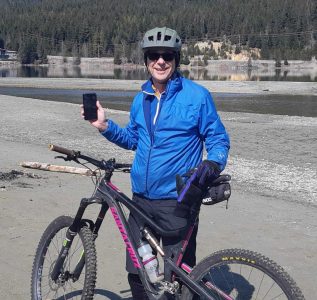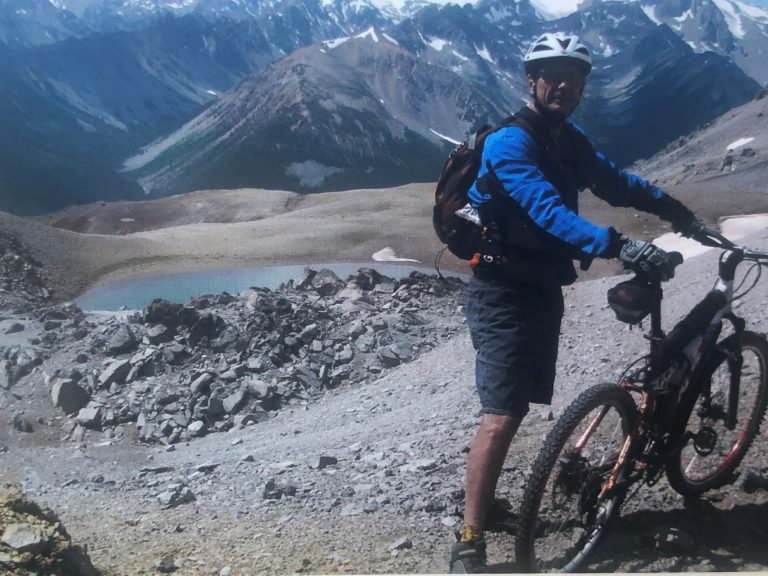Throughout their diverse and storied careers, UBC Department of Medicine faculty members acquire a wealth of clinical, educational, and leadership knowledge and skills. We value the experience of our retiring faculty and seek to capture some of their valuable insight and wisdom to share with the UBC Department of Medicine community. We hope that our current faculty will find these perspectives useful as they consider their own career paths.
Dr. Jake Onrot was born and raised in Toronto, Ontario and is a general internist and hypertension specialist at St. Paul’s Hospital.
Dr. Onrot is well known as one of the best diagnosticians in the country – he has taught countless students, residents and colleagues about clinical diagnosis, Bayesian inferences, Occam’s razor and Hickam’s dictum.
After a 35-year career, Dr. Onrot, retired on December 31, 2020, from the Department of Medicine in the Division of General Internal Medicine and is enjoying family life and many wilderness adventures in Whistler like mountain biking and skiing. Hopefully, post-pandemic travel is in his future.
Tell me about where you were raised and what brought you to medicine?
At one of the first talks I ever gave, I was introduced by a very funny man who said, “Dr. Onrot was born in Toronto, went to public school in Toronto, went to secondary school in Toronto, did his undergraduate in Toronto, he went to medical school in Toronto and did his residency in Toronto.” So the short/joke answer is Toronto. After that, I did a two-year fellowship in clinical pharmacology and hypertension at Vanderbilt University in Nashville. David Robertson was my mentor there. He was born in a small farmhouse near Nashville and I met his mother who still lived in that house at the time, fifty years later! He was a renaissance man, despite his humble beginnings, and had a library, complete with ladders and a mezzanine built onto his house. He learned Icelandic and Russian and wrote the first English-Icelandic dictionary in his spare time when he was not a world-renowned expert in orthostatic hypotension. As such, he was part of the medical advisory team for Russian cosmonauts. My lab had an international cast of characters and I ended up with publications in Arabic and Russian as a result.
I was very fortunate that I was hired by Dr. John Ruedy at St. Paul’s before I went away for my fellowship and had a job to return to, which is very unusual. Most people have to go and get their fellowship and then look for a job, so I was very blessed and felt appreciated that way by St. Paul’s. So the journey started in Toronto, moved on to Nashville and then concluded in Vancouver. I tried to get a job in Toronto after my training, but they weren’t hiring, so I ended up in Vancouver. The best thing to ever happen was for me to end up in Vancouver. As I’ve said before, the continent is sloped east to west, and unless you have strong roots to put down in the east, you’re going to end up in the west.
What was your first job at UBC?
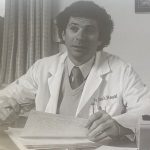 My very first job was my very last job – all at St. Paul’s Hospital. I was hired to work on the clinical teaching unit, run the outpatient clinics in internal medicine and the blood pressure clinic, and that’s essentially what I did until the very end. I did stop doing ambulatory about eight years ago.
My very first job was my very last job – all at St. Paul’s Hospital. I was hired to work on the clinical teaching unit, run the outpatient clinics in internal medicine and the blood pressure clinic, and that’s essentially what I did until the very end. I did stop doing ambulatory about eight years ago.
How do you feel about the new St. Paul’s site?
I’ve had a little bit of jealousy over the years visiting other new and fancy hospitals. I think the new site is fantastic, but I also think there’s a role for St. Paul’s as a site serving the west end. I would be sad to see the old hospital go, and I’m also delighted to see the new hospital. From a physician’s point of view, the core physicians at St. Paul’s that are moving this forward and doing the planning are doing a great job and should be recognized for it.
Did you have any life-changing experiences that put you on a career path?
It was a fortunate chain of coincidences, really, that I ended up where I did.
I wanted to be a mathematician/physicist when I entered university. I had always done very well in school, so my family expected I would go into a profession like a doctor or a lawyer. I somewhat resisted that path due to some rebel tendencies. I eventually realized that medicine was what I was born to do, and I have the tool kit that best suits the job – but it was a lot of coincidences that led me this way.
I never really let go of my love of math, and when I stopped running the ambulatory care and the blood pressure clinic, I was looking for an area to put my expertise to work. I began teaching evidence-based medicine and a clinical decision-making approach to diagnosis, and most of my talks include a section on math for non-mathematicians. It can be a little bit off-putting to my friends when I start talking about decision-making when we just want to cross the street. I put everything into a probability, and I think they’re a little tired of that.
What is your career highlight?
There are a few things I’m really proud of. One is resident research day. In the beginning, it was in the basement auditorium at UBC. Along with some clever chief residents, we were able to mimic a national meeting. We were the first university to have a high-end research day. I shepherded it for about 20 years, and I’m very proud of that. The other thing I am proud of, again with the help of the senior residents at St. Paul’s, is that we began the first morning report in Canada. It’s the same morning report that’s been going for at least 30 years, and now it’s evolved into a podcast too.
For the non-physicians out there, walk us through the process of how the morning report developed?
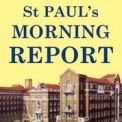 The morning report was initially to review and teach around a recent case. Here’s a little history: there used to be the Crest Club Cafeteria, which was in the bowels of the Comox building at St. Paul’s. And in the bowels of the cafeteria, there was a conference room. We would meet every morning, and the team from the night before would present their most interesting case. We would discuss it and teach around it and, as a group, help the doctors who were looking after the patient come up with the best plan for that patient. It was usually a patient chosen to be the most interesting or the most complex from the night before. The residents had come across this concept in the states and brought it to me, and we started it up, and it’s been going on for 30 years. I look back on that and hope that I made a difference. I take pride in being a clinician teacher and watching the accomplishments of my students. I would call up experts to help me with cases, and so often, they were my former medical student, resident or fellow. That’s something to be proud of – that I’ve had some influence on the development of a vast coterie of doctors that have come through St. Paul’s.
The morning report was initially to review and teach around a recent case. Here’s a little history: there used to be the Crest Club Cafeteria, which was in the bowels of the Comox building at St. Paul’s. And in the bowels of the cafeteria, there was a conference room. We would meet every morning, and the team from the night before would present their most interesting case. We would discuss it and teach around it and, as a group, help the doctors who were looking after the patient come up with the best plan for that patient. It was usually a patient chosen to be the most interesting or the most complex from the night before. The residents had come across this concept in the states and brought it to me, and we started it up, and it’s been going on for 30 years. I look back on that and hope that I made a difference. I take pride in being a clinician teacher and watching the accomplishments of my students. I would call up experts to help me with cases, and so often, they were my former medical student, resident or fellow. That’s something to be proud of – that I’ve had some influence on the development of a vast coterie of doctors that have come through St. Paul’s.
Listen to the St. Paul’s Morning Report podcast:
It sounds like being a mentor was incredibly important to you. Who were your most important mentors throughout your career?
To start, it would be Dr. John Ruedy, who was the chief of medicine at St. Paul’s and hired me. He took an interest in my career, and he helped me get set up in Nashville for my fellowship. Also, the aforementioned David Robertson. There was also Dr. Robert Rangno who headed up the blood pressure clinic and was a clinical pharmacologist at St. Paul’s. He is also known as “Chainsaw Bob” for his wood sculptures. One resides right outside the entrance to our ICU/CCU. Bob and I did the blood pressure clinic together for many years. Bob was very active nationally in clinical pharmacology and helped bring me into the fold at St. Paul’s. As well, I’d like to acknowledge my colleague and homie, Barry Kassen, who continually astounds me with his knowledge and lateral thinking ability. I’d also like to give a shout-out to a doctor named Howard Stein. Dr. Stein was a rheumatologist/internist who unfortunately passed away young from cancer. He was the best internist I ever met, and I tried to model myself after him.
What do you think is the most important attribute to have as an internist?
There are so many, but at the root of it all, it’s that you need to care. I always indulged myself in thinking that the staff at St. Paul’s – not just medical staff but everybody that works at St. Paul’s – had that special quality that set it apart from other places.
What advice would you have for a junior faculty member in your field?
Do your job and do your part. Your job is to make life better for the people around you.
What advice might you have for a senior faculty member approaching retirement?
The hardest thing to do is to retire.
You’ll know when it’s your time, and you have to plan carefully. As I said, you do your part. You have to have an idea of what is going to happen at St. Paul’s (or wherever you are) after you’re gone. It’s not self-centric; you have to consider what’s going on around you and take steps to make yourself available as a resource and not just disappear completely. On the other hand, you also have to make yourself dispensable.
And aside from that, you have to plan for what’s going to happen in your personal life.
What will you miss most about working at UBC?
I’m going to miss the people. It’s the social interactions, the teaching and the patient care, but it’s the people at the core. I don’t just mean doctors; I mean everybody that I worked with. You are somewhat more isolated after retirement, and of course, everybody is a little more isolated in this pandemic.
Technology has been a boon. I’ve experienced funerals, celebrations of life, monthly book club – all experienced virtually. Culturally it’s changed our lives so much. We used to go to work with our colds and go out to restaurants with our colds – and the worst thing that would happen is we’d catch a cold. I understand human nature, and I think the drive to return to pre-pandemic habits will be so great, but there’ll be a few years where there are not that many cases, and we will start getting back to “normal. ” There are some people who think that Covid will become like influenza; you’ll get vaccinated for it annually, but we’ll see what happens. Most of us who lived through September 11 thought it was the most cataclysmic and civilization-changing event that we could conceive of. And not to disrespect September 11, but it’s turned out that Covid has been a far more civilization-changing event.
What did you want to do in your retirement?
Sleep in (laughs).
And I must say I haven’t really denied myself over the years of my passions. I’ve managed to travel, ski, bike, and socialize, so it’s not like I’m going to *start* doing all of these things in retirement. It’s more of a continuation of the same. I’m newly married, my wife Shivlyne is a nurse at St. Paul’s, and I have a 15-year-old daughter named Annabelle and a stepdaughter, Cadence. I thought I would get to spend more time with them and more time in Whistler. Spending more time in the outdoors, skiing, biking, hiking and travelling and reading. Basically, just riding off into the sunset is what I’ve envisioned of my retirement.
I would also like to do some writing, but I haven’t gotten into it yet. Perhaps some autobiographical and some medical – like mathematics for non-mathematicians.
Storytelling is important. Just hearing a story, even if you don’t completely grasp its meaning, has value. I worked in a medical school among the Tibetan Buddhist community in exile in northern India, and one of the tenets of Buddhism is called the Oral Tradition. It holds that just hearing the words spoken has educational value. Stories that we tell to our kids, even if they don’t quite get it at the time, helps them accumulate knowledge and gives them a picture of your life and life before them. I think that’s an important thing to pass on from generation to generation. I looked back and wasn’t happy that my parents didn’t tell me enough about themselves, and they didn’t write anything down. And so, as they aged, I tried to interview my parents and family members to get a feel for the family and the genealogy. I have a cousin who interviewed her mother, a Holocaust survivor. They self-published a book about her experiences through the war and now their children and grandchildren- they have a written record of a seminal event in history. It’s hard to make things real when you don’t personally experience them, and they occurred on the other side of the world 80 years ago. But you should never forget.
What stories would you still like to tell?
I have a reputation as a storyteller. My students politely listen to me, carrying on about various topics. I have so many stories – every patient I have reminds me of another patient – memories of a difficult case or a learning point, so my stories about patients can come up at any moment. I’ve also travelled extensively, and everyone has travel stories. I have a gazillion travel stories, but the one I tell the most occurred in 1995 when I was trekking in Nepal at 4400 meters.
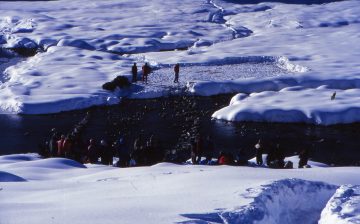
Waiting for the chopper: It took 25 of us an hour to stomp down a “heliport”, lay out a big “H” and put up a windsock. The helipad was across a creek and the stepping stones would ice over in the late afternoons. The trekkers were organized for boarding, but as soon as the locals heard the sound of the approaching choppers, they would rush the pad, often slipping into the creek (as did I), and crouch down behind their bags off to the side. Many bags got blown away. Eventually we had to put a guard up on the stones. You can see the foreground and the depth of the snow track. The chopper pilots only wanted to take trekkers (for pay), but we insisted on a 1:1 trekker/Nepalese evacuee ratio.
There was a freak blizzard, and six feet of snow fell. We were snowed in for a week, and we had to be evacuated by helicopter. Many people died in that snowstorm – being trapped high in the mountains either by landslides or avalanches. It was a worldwide tragedy. At the time, it was the greatest mountain rescue ever performed because so many people were evacuated by helicopter from these hot spots. I was 45 years old and much older than the other trekkers. There were a couple of experienced mountaineers in the group, and I was the doctor, so they looked to the three of us for guidance and leadership. We were in an unheated dorm, below zero at night, and I would just get comfortable in my toasty sleeping bag, and someone would come in looking for “the doctor”. Then I’d get up and trek through the snow to do a house call. It was an amazing experience organizing the westerners for the evacuation and making sure the Nepalese were also served – to ensure an egalitarian evacuation. That was the big adventure of my life.
How did you manage to cope through such a monumental and stressful event? Did anything come up for you that you didn’t expect?
Everybody just dealt with it – it’s like I tell my students – do your job and make life easier for everybody around you. That’s all it is.
I never really thought I would die, and I never thought I’d go hungry; I never felt threatened. The only contact we had with the outside world was the transistor radio that the lodge owner had, no satellite phones or anything. After two or three days, we heard that 26 people had perished in an avalanche about 5 km away from our position. What I had to focus on for the days following was to convince people NOT to try to make their way out by foot because the danger of avalanches was so great. People were still insisting on making a trail to get out, and I was trying to tell them that it wasn’t safe and that the helicopters would come and instead we should prepare for the helicopter evacuation. It reminds me of the whole COVID plan – there is a process. There are decision points that people have to make, and the consequences of a wrong decision need to be considered. In one case, the result of one of those decisions was that many westerners died in an avalanche. And in the other case, many westerners were safely helicoptered out. There are all kinds of parallels- you have to calculate the probabilities and the odds and the benefits. That’s where my training comes in.
Any final thoughts?
I’d like to say something about Anita Palepu. Anita is a dear friend. I had corresponded with her for months before I actually met her. She’s been an incredible boon to the department. She’s an incredible leader, and she’s a wonderful human being. She is the best listener I know. I have the utmost respect for her, and I think she’s the right person for the times.
I do have one regret upon retiring. People like me and Iain (Mackie) and Barry (Kassen) in GIM were there from the inception of the division. Others like Bob Schellenberg, Jack Amar, David Landsberg etc were at SPH before me. It comes back to the oral tradition that we talked about. We are the keepers of the stories and the knowledge and experience. We’ve seen it all. When one of us retires, there is a void from a historical perspective. It’s a regret, and why I’d still like to be in the background. I really love it when colleagues call me and ask me questions or ask for advice.
The Department of Medicine is incredibly grateful to Dr. Onrot for agreeing to be interviewed and being so generous with his time and insight.
